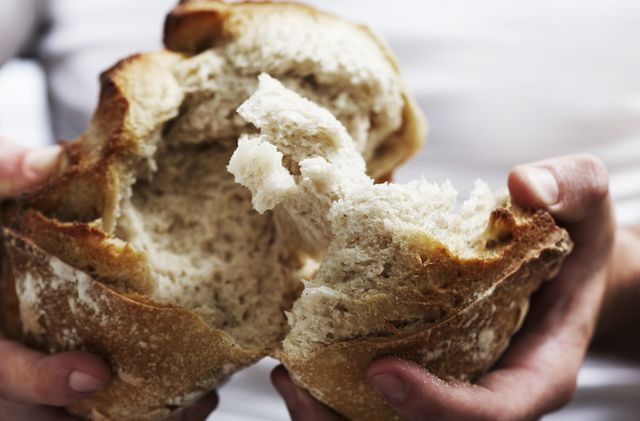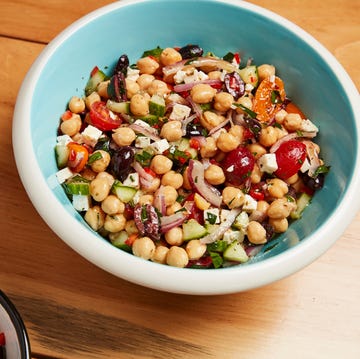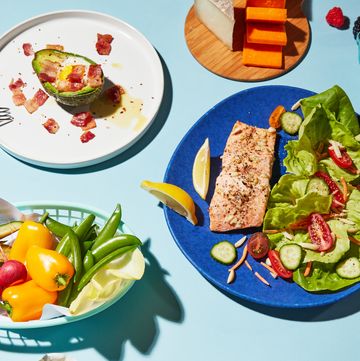It’s an ongoing debate in the nutrition world: Is one kind of diet—say, low carb or low fat—better than another for weight loss?
It seems like research comes out on the regular that’s in favor of one kind of eating, only to be overshadowed by another study that suggests the opposite. So, what’s a health-conscious runner trying to drop a few pounds to do?
Now, it looks there’s another wrinkle to add to the mix: The BMJ just published a report, which found that people who followed a low-carb diet burned more calories than those who consumed a high-carb diet.
But before you get excited, we’re here to tell you why you should take the findings with, er, a grain of…sugar.
What the New Low-Carb Study Found
In the study, researchers assigned overweight and obese people who had previously lost weight to one of three weight-maintenance diets: the first to a high-carb diet (60 percent of their diet from carbs), the second to a moderate-carb diet (40 percent of their diet from carbs), and the third a low-carb diet (20 percent of their diet from carbs) for 20 weeks. The protein for each group stuck to 20 percent.
At the end of the experiment, the researchers found that those on the low-carb diet burned 209 to 278 calories a day more than those on the high-carb diet. That translated to 50 to 70 calories a day for every 10 percent decrease in carbohydrate intake.
That’s not insignificant, says Heather Caplan, R.D.
“But at a certain point, your body is going to even that out,” she says. “Your metabolism will slow down or speed up to stay alive.”
People on the low-carb diet who had high levels of insulin secretion—insulin is produced after consuming glucose, the sugar found in carbs—burned even more calories: up to 478 calories a day.
Researcher David Ludwig, M.D., Ph.D., a professor in the department of nutrition at Harvard T.H. Chan School of Public Health, suggests this may be because insulin promotes fat storage and inhibits the release of calories from fat cells. Processed, fast-digesting carbs—white, refined carbs—are the most powerful when it comes to stimulating insulin secretion.
“People with high insulin secretion will be especially sensitive to high amounts of carbohydrate,” Ludwig, the director of the New Balance Foundation Obesity Prevention Center at Boston Children’s Hospital, told Runner’s World.
The study also found that those on the low-carb diet had decreased levels of the hormones ghrelin and leptin, which inhibits insulin secretion and increases appetite, and regulates fat storage in the body, respectively.
“When your eating habits change so drastically like those in the study, there will be changes to the hunger hormones that we don’t entirely understand,” says Kelly Hogan, M.S., R.D., a dietitian in New York City.
So why might a low-carb diet be linked to increased calorie burn? While the overall nutrition field is split on this, the researchers think it’s because not all calories are equal and have different effects on the body.
“A low-carbohydrate diet, by reducing insulin levels, helps take fat cells out of storage overdrive,” says Ludwig. “With more fuel available for the muscles and brain on a low-carbohydrate diet, energy expenditure doesn’t drop as much following weight loss.”
What This Low-Carb Study Means for Runners
Before you jump on the low-carb wagon, there are a few things to consider. One of the most important is your training as a runner. And this study looked at a general population, not athletes.
That changes the story on nutrient guidelines. Generally speaking, the low end of recommended daily intake of carbohydrates is 45 percent. For runners, that number jumps to 55 and 65 percent, depending on weekly mileage and training goals.
Remember, the study defined high-carb diet as 60 percent daily intake from carbs. So to follow a diet that consists of just 20 percent carbohydrates—that’s only about four ounces of pasta if you’re eating 2,000 calories a day—is not only incredibly challenging to sustain, it could affect your training goals, says Hogan.
“Fruit has carbs, vegetables have carbs. You’re not just avoiding bread, rice, pasta,” she says. “And your brain alone needs 130 grams of carbs [520 calories] to function optimally. Consuming that few carbs will put people at risk for fatigue, and poor recovery after workouts and long runs. It’s definitely not something I’d recommend.”
It’s also worth noting that the participants had all of their meals prepared, which allowed them to follow the diet perfectly. In the real world, that probably won’t happen.
“The study participants who were able to survive, to finish the study, had all of their food prepared for them. It was a short time period, and they were being paid,” says Hogan. “All of those factors over the short term—this study was just 20 weeks—will help with compliance.”
[Build a killer midsection in the kitchen for effortless miles on the road with Eat for Abs!]
Problem is, you want your way of eating to keep working for you in the long-term—and this one just isn’t likely to hold up. And that sustainability issue is a crucial flaw with seeing a restrictive diet as a cure-all to your weight problems.
“The hypothesis the researchers are making that this could have the same result over years is completely inaccurate,” Hogan says. “When you leave people to their own devices to follow a restrictive diet, it’s not physiologically possible.”
Ludwig defines long term as at least 18 months to two years. But that is a blip when you’re looking at a lifetime of weight maintenance.
“If you’re trying to treat weight-loss maintenance, I’m assuming that will last forever,” says Caplan. “So when does that phase end? And then what?”
Research has shown that while people will lose weight on a restrictive diet, maintaining that weight loss is almost impossible.
“Most people gain the weight back and then some,” says Hogan. “So there’s no benefit to a restrictive diet in the first place.”
At the end of the day, sports dietitians agree that cutting out certain foods might help you lose weight, but it’s not sustainable. Instead, follow a balanced diet that’s high in lean protein, healthy fats, fruits and vegetables, and complex carbohydrates like brown rice, quinoa, and sweet potatoes. And run.
“We shouldn’t be so concerned with calories burned as opposed to, are we eating when we’re hungry? Are we stopping when we’re feeling satisfied?” says Hogan. “There are so many other things to think about when it comes to overall health and wellness.”
Heather is the former food and nutrition editor for Runner's World, the author of The Runner's World Vegetarian Cookbook, and a seven-time marathoner with a best of 3:31—but she is most proud of her 1:32 half, 19:40 5K, and 5:33 mile.













